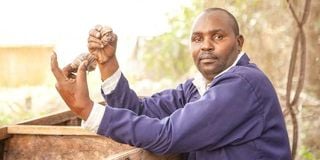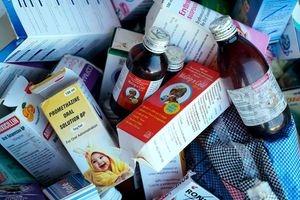Cough syrup made from snail slime on the way

Dr Paul Kinoti, a lecturer at the Department of Horticulture and Food Security at Jomo Kenyatta University of Agriculture and Technology (Jkuat), displaying some of the snails in the greenhouse on January 16, 2023. Researchers at the institution are carrying out a study that will see the manufacturing of cough syrups from snail slime locally. MAGDALENE WANJA | Nation
What you need to know:
- The sweltering heat experienced in most parts of the country is an asset to scientists researching the use of snail slime to treat children’s dry coughs.
- The researchers from the Jomo Kenyatta University of Agriculture and Technology told the Nation that the mucus can be used in the making of cough syrups locally.
- We find Dr Paul Kinoti braving adding water to snails housed in wooden boxes inside one of the greenhouses at the Jomo Kenyatta University of Agriculture and Technology (Jkuat).
The sweltering heat experienced in most parts of the country is an asset to scientists researching the use of snail slime to treat children’s dry coughs.
The researchers from the Jomo Kenyatta University of Agriculture and Technology told the Nation that the mucus can be used in the making of cough syrups locally.
We find Dr Paul Kinoti braving adding water to snails housed in wooden boxes inside one of the greenhouses at the Jomo Kenyatta University of Agriculture and Technology (Jkuat).
The food technology lecturer says that a visit to Ghana inspired him to delve into the research.
“One time when I went to Ghana, I noticed that they use snail slime for medicinal purposes. Just like we have traditional medicine in our country, they too have that as their traditional medicine and accompany it with honey,” he says. When he came back to the country, he decided to do more research to come up with Kenyan cough syrup.
Jkuat partnered with the National Museum and the Kenya Wildlife Service (KWS) to start breeding snails and train farmers on how best to farm them.
KWS is involved because snails are categorised as wildlife. The National Museums of Kenya, on the other hand, help in acquiring the snails.
“We had a challenge initially in identifying breeds that we needed, we had to get some from as far as Kakamega forest,” Dr Kinoti says. He explains that snails from dry areas are the most sought-after because they have about 12 compounds used for medicinal purposes.
“We think that the sun rays are an asset to snails in dry areas because they produce more slime with essential compounds that can be used to treat dry coughs,” he explains.
According to Dr Kinoti, the project is based on three types of snails – the giant African land snails (Achatina fulica), Achatina achatina found mostly in Ghana and Uganda and Achatina marginata found in Nigeria, Ivory coast, Cameroon and Liberia.
WHo requirement
The World Health Organization, Dr Kinoti says, requires that the snails should not be destroyed in the process of extracting slime.
“We had to invent our own ways such as the use of citric acid,” he says.
The snails are washed and sanitised using an alcohol-based sanitiser to prevent contamination. A citric acid-water solution is then made, and after irritation, the snail produces slime. The slime extracted is then purified by removing the citric acid.
The university was lucky to get a grant of about €950,000 (about Sh128 million) from an Italian organisation Cherasco Snail Breeding Institute.
“These funds will go a long way in supporting our Kenyan farmers, especially women and youth, to engage in a meaningful economic activity with a constant income. Through snail farming, we can produce slime to be used to synthesise cough syrup,” he said.
Scientists say cough syrups will be available in Kenya by 2027.
Prior to the cough syrup idea, JKUAT researchers used slime to manufacture skin care products like soap, creams and gels.
Farmers that wish to be part of the project need to adhere to some requirements, including getting a permit from KWS.
“We intend to have farmers as the main suppliers in the already available market and that’s why we have been focusing on equipping them with the skills,” Dr Kinoti said.






